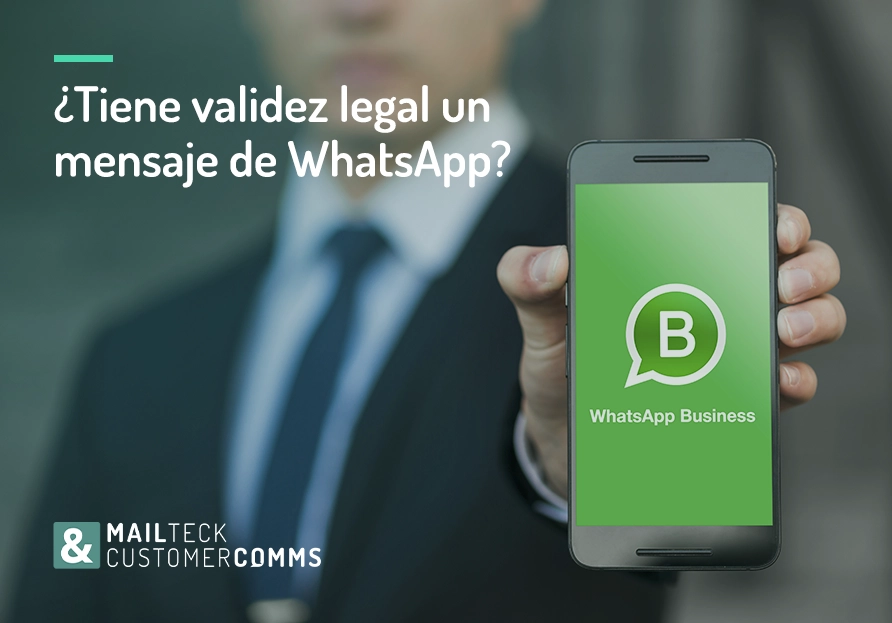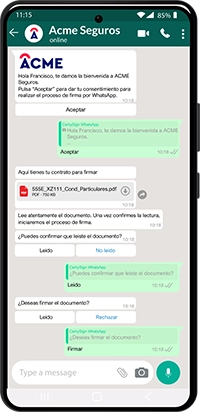
Introduction
There is no doubt that WhatsApp is one of the most popular instant communication channels. Its immediacy and accessibility make it the preferred tool for sending any type of information, and it is used by both companies and individuals (the latter in their private and professional spheres).
All this has fostered a democratization of the use of technology for all audiences, and especially with regard to this application. This technological accessibility has made it easier for people of all groups to benefit from its advantages, enjoy their user experience and feel comfortable in digital environments.
Does a communication via WhatsApp have legal value?
Here we have to distinguish between a certified WhatsApp (irrefutable legal value) and an uncertified one, whose validity depends on the judge’s criteria.
A WhatsApp by itself has no legal validity, it all depends on the judge who has to assess the evidence. In order for any judge to question a WhatsApp message as evidence, it will have to be sent in a certified form, in the same way that an email has legal validity if it meets the same requirements.
It should be noted that a WhatsApp is easily modifiable.
The lack of integrity and authenticity of the information transmitted through WhatsApp screenshots was what was not admitted as documentary evidence in the appeal 17/2024 of the High Court of Justice of Madrid, where the court was to assess the nature of the dismissal of a company worker.
However, there are legal proceedings in which evidence offered through WhatsApp conversations has been considered as valid, although nothing guarantees the success of the proceedings without the use of other additional elements of the process.
WhatsApp for Business use cases
To give you some background, there are two versions of WhatsApp, one for individuals (the one we all know) and one for businesses, the latter called WhatsApp for Business. The main feature of this latest version is that it verifies the identity of the company that is using it, making phishing and associated phishing maneuvers more difficult. So much so that many companies have already implemented WhatsApp for Business within the flow of regular communications with customers. In the case of the insurance sector we can name the following examples:
- Sending of pre-contractual information.
- Sending of documentation related to an insurance policy (signing of particular conditions, sending of renewal letters, claims forms, notice to update means of payment, etc.).
- Collection of consent for the processing of personal data.
- Obtaining consent for the sending of commercial communications.
- And many more.
But some companies are still somewhat reluctant to implement them, claiming that their use may produce risks within the organization or that their evidentiary effects, in case of litigation, may be limited. Well, in this article we will clarify some legal doubts about the legal validity in court of communications sent by WhatsApp.
Regulations and jurisprudence
 First of all, both the regulations and the case law and doctrine consider that there is no objection to the use of this application as a method of communication, of collecting GDPR consent and even of signing documentation, as long as it is reinforced by other mechanisms, such as the authenticity and integrity of the information transmitted.
First of all, both the regulations and the case law and doctrine consider that there is no objection to the use of this application as a method of communication, of collecting GDPR consent and even of signing documentation, as long as it is reinforced by other mechanisms, such as the authenticity and integrity of the information transmitted.
In another blog post we made reference to what would be the criteria for admission of evidence at trial in the case of communications via WhatsApp. In it, we indicated that the Civil Procedure Law and the jurisprudence of the Supreme Court in judgment 300/2015, May 19, 2015, establish that electronic communications, such as WhatsApp messages, can have evidentiary validity as long as fundamental rights are respected and they are obtained in a lawful manner, In such a case, it is essential to carry out an expert test to identify the true origin of the communication, the identity of the interlocutors and, finally, the integrity of its content.
The value of the qualified trusted service provider
It is clear that a greater guarantee will always be obtained in the event of litigation the more evidentiary elements that can be provided as proof. Among them we can highlight from a screenshot to the implementation of a qualified signature within the process of sending communications via WhatsApp.
In this sense, at MailComms Group, as a trusted service provider qualified in the certified electronic delivery service, we are able to provide sufficient evidence to defend the validity of this process before third parties, since in accordance with the provisions of Article 326 of the Civil Procedure Act, it provides a presumption iuris tantum.
That is to say, in the case of having employed any qualified trust service, if the electronic document were to be challenged, the burden of proof would be on the one who submitted it. And if these checks give a negative result, the costs, expenses and fees will be borne by whoever contested it, even with the possibility of imposing a fine of 300 euros to 1200 euros in the event that the challenge is reckless.
On the other hand, if the service provided by an unqualified trusted supplier is used, in the event of a challenge to the authenticity of this document, the party who submitted it may request an expert comparison or propose any other means of proof that may be useful and relevant for the purpose. In other words, it will be necessary to have the intervention of a computer expert to certify the authenticity of the conversations and their integrity to prevent the opposing party from challenging their validity.
Probative warranty of certified WhatsApp
 In the context of GDPR consent collection and document signing processes, WhatsApp can count on sufficient guarantees during signer authentication and in the final signature process. In this way, it will be possible to accredit sufficient evidence to obtain an advanced electronic signature with fully valid legal effects before a judge.
In the context of GDPR consent collection and document signing processes, WhatsApp can count on sufficient guarantees during signer authentication and in the final signature process. In this way, it will be possible to accredit sufficient evidence to obtain an advanced electronic signature with fully valid legal effects before a judge.
It emphasizes in this context the importance of proving the moment of consent and the integrity of the evidence, in addition to providing a final certificate of evidence recording all the main events of the communication between the parties. This statement will have to include the record of the conversation itself held via WhatsApp in order to prove, if necessary and effectively, the validity of the contract concluded in the context of legal proceedings.
In short,
the system proposed by MailComms Group, with WhatsApp as a means of communication, acceptance and signature,
complies with the legal and technological requirements to guarantee the validity, security and evidence of the transactions carried out through said application.
Service audited by ECIJA
For this purpose , we have a report prepared by the law firm ECIJA, specialized in digital legal communications, which confirms that the certified WhatsApp service offered by MailComms Group complies with the stipulations of the regulations: eIDAS and the General Data Protection Regulation. This confers the conformity of the tool and its use as a channel for sending certified communications between companies and clients.
As a closing of this content you will find a video in which Alonso Hurtado, lawyer at ECIJA, explains how was the criterion carried out for the evaluation of WhatsApp certified MailComms as a communication channel with full probative value.
Article written by
Soraya de Caso, head of Business Legal Consulting.
